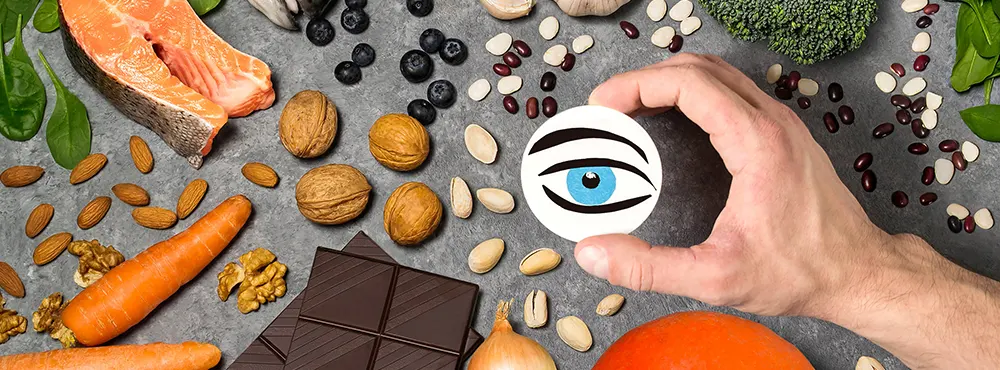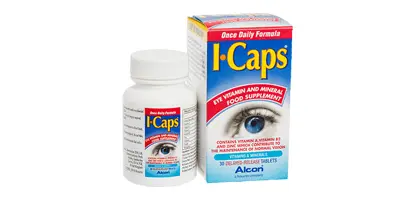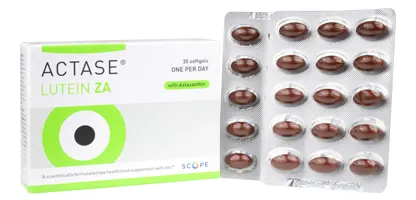Do you know the best vitamins to maintain optimal eye health? Our optician-approved article will help you understand the importance of vitamins and why they are essential to include in your diet. Maintaining good eye health is just as important as maintaining overall body health.
The best way to get vitamins and minerals is by eating a varied and balanced diet. Some people may benefit from taking vitamins for eye health, while others may not need them or may experience side effects. Before taking any eye health vitamins, it is important to consult your doctor or optician, who will advise you on the best vitamins for healthy eyes.
The following vitamins can contribute to keeping your eyes healthy:
1. Vitamin E
- Vitamin E may help prevent conditions such as age-related macular degeneration (AMD). Incorporating vitamin E along with other important nutrients can potentially reduce the risk of advanced age-related macular degeneration and cataracts.
- Vitamin E has some antioxidant and anti-inflammatory properties which can help reduce the inflammation in the eyes, contributing to overall eye health.
Sources of vitamin E
- Nuts and seeds
- Vegetable oils
- Leafy green vegetables
Available online at Feel Good Contacts, ICaps Tablets are multivitamins tablets, infused with a range of vitamins and minerals to help maintain healthy eyes.
2. Beta Carotene
Foods containing beta-carotene are good for your overall eye health as they can enhance night and peripheral vision. Beta-carotene can be absorbed by the body and turned into vitamin A when you include the following foods in your diet:
- Carrots
- Red and yellow peppers
- Sweet potatoes
- Pumpkin
- Dark leafy greens
3. Vitamin A
One of the benefits of vitamin A is supporting the production of rhodopsin, a pigment in the retina, crucial for low-light and night vision.
Did you know that the human body does not naturally produce vitamin A? However, similar to other vitamins, it can be consumed through certain foods and supplements as listed below:
- Beef liver
- Eggs
- Fish oils
- Plant sources, such as carrots, tomatoes, green leafy vegetables, and sweet potatoes
4. Lutein and Zeaxanthin
Lutein has anti-inflammatory properties and is naturally found in the eye tissue. It can help towards protecting the retina from the damage caused by the sun’s harmful UV radiation.
Both lutein and zeaxanthin offer plenty of benefits, including:
- Improving visual contrast sensitivity
- Enhancing vision sharpness
- Protecting eyes from harmful blue light
Sources of Lutein and Zeaxanthin
Including the following foods in your diet will help to increase your levels of lutein and zeaxanthin
- Colourful fruits
- Cereals
- Egg yolk
- Leafy green vegetables
- Semolina
- Corn
Since lutein is fat-soluble, combining these foods with healthy fats like olive oil can improve its absorption.
5. Vitamin C
Vitamin C plays an important role in maintaining eye health as it is a powerful antioxidant, which helps protect the cells in the eyes and support eye health. An adequate intake of vitamin C may lower the risk of developing age-related macular degeneration (AMD) and cataracts.
Foods rich in vitamin C include
- Citrus fruits such as oranges and lemons
- Strawberries
- Greens such as broccoli and kale
- Yellow peppers
6. Omega-3 Fatty Acids
Benefits of omega-3 fatty acids:
The regular consumption of omega-3 fatty acids may lower the risk of developing AMD and could even slow its progression in individuals already affected by the condition. Including omega-3 fatty acids can also help towards treating dry eye syndrome by increasing the quantity and quality of tears.
Sources of omega-3 fatty acids
- Fatty fish: salmon, mackerel, sardines
- Plant oils: flaxseed, soybean and canola
- Flaxseeds and chia seeds
- Walnuts
7. Zinc
High levels of zinc are found in parts of the retina called the macula and it is beneficial for good eye health. Zinc enables vitamin A to produce a pigment known as melanin, which helps to protect the eye.
In the Age-Related Eye Disease Study, individuals who were at high risk of developing advanced stages of macular degeneration had a 25% lower risk of developing the condition after taking a supplement containing zinc.
Sources of Zinc
- Oysters, crab and lobster
- Beef, pork and lamb
- Dairy products and eggs
- Nuts, seeds and legumes
Eating a nutritious and well-balanced diet is key to maintaining good eye health. Although supplements are a viable source of these nutrients, obtaining them through a wide range of foods is more ideal. If you are thinking about taking vitamins and supplements it is important to consult your general practitioner or an eye care professional, who will advise you on the best vitamins for healthy eyes.
Disclaimer: The advice in this article is for informational purposes only and does not replace medical care or an in-person check-up. Please check with an eyecare professional before purchasing any products or remedies. For information on our article review process, please refer to our Editorial Policy.

 Offers
Offers Account
Account
 Favorite
Favorite
 Basket
Basket

 OFFERS
OFFERS

















